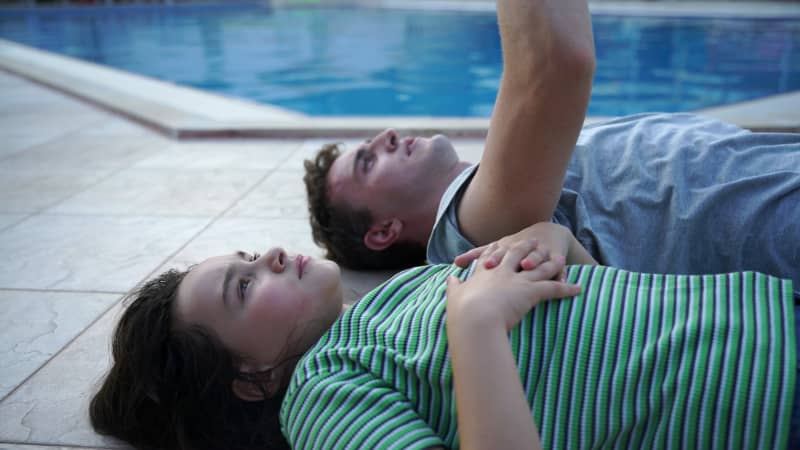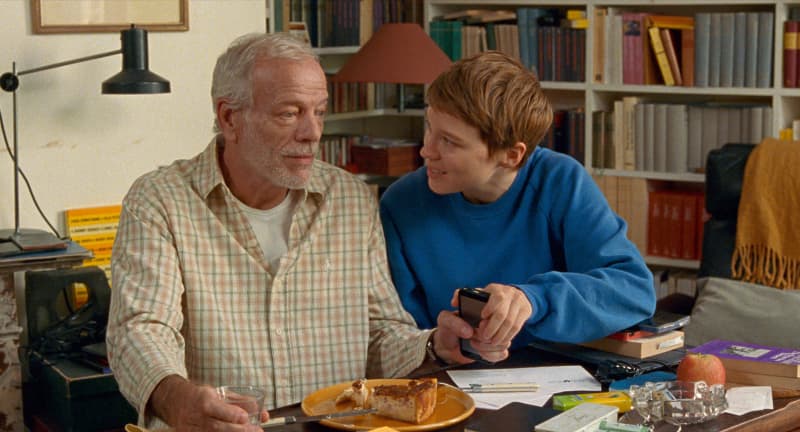
Scottish director Charlotte Wells’ award-winning debut feature deals with memories and loss in a way that has made it one of the most talked-about films of the moment.
Tour guides dance the macarena in yellow shirts tucked into khaki shorts. This tourist evening entertainment, the lemon Fanta and the pixelated image of a MiniDV video camera are the nostalgic elements with which the recent film *Aftersun – our day in the sun* charms its viewers *-* before it breaks their hearts.
– Looking at the photos, I was struck by how young my father looked. I was almost the same age myself at the time, so I got the idea of a young father and his daughter on holiday. The idea came to life and it became a film about memories, sadness and love.
From Cannes’ smallest series to Obama’s favourite
At the end of last year, when the critics published their lists of the best films of the year, the small and intimate *Aftersun* was a prominent presence, often right at the top. British Sight
On the other side of the Atlantic, Mescal also received an Oscar nomination for his role as best actor, and Wells won the Directors Guild of America award for best directorial debut.
There has been quite a bit of success for the film by an unknown director, which had its world premiere in the smallest program series of the Cannes Film Festival during Critics’ Week, alongside the Finnish *Metsur’s Story*.
Topics from your own life
There is another reason for mentioning Spielberg besides the critics’ embrace and the shower of awards. The director legend’s newest film *The Fabelmans* is also based on the author’s own life.
In recent years, however, elements taken from one’s own life have increased significantly in films. In addition, many of them describe life in a less grandiose way, focusing on the joys and problems of everyday life.

– I believe that I became a part of this phenomenon by chance, because I have been doing *Aftersun* for eight years already. As for the authors who write faster than me, I think the corona pandemic had something to do with the fact that they have found time to think about their own lives, says Wells.
*Kaunis aamu* premiered in Finland last week on the same day as *Aftersun*.
An attempt to understand suffering
However, let’s get back to *Aftersun*. Beneath the sunny surface of the trip to Turkey it describes, there is a darker undercurrent. Almost from the beginning of the film, it is clear that something is wrong in Calum’s life.
The feeling is reinforced by the interspersed shots of the film, where the grown-up Sophie stands with a serious expression in the middle of the dancing mass in the flickering of strobe lights. It’s as if he too is looking at his own childhood memories and desperately trying to understand his father and his own conflicting feelings that the memories evoke in him.
Watch the official trailer for Aftersun here.
Calum’s character is based on Wells’ own father, who died when he was young. Based on his own experience, the director wanted to show the father-daughter relationship as a good thing in both of their lives.
– I wanted it to be clear from the first picture that their relationship is warm and loving. They get something unique, strength from each other. In addition, the father gains meaning in his life from being a parent, says Wells.
Ultimately, the director wanted to leave the viewer the freedom to interpret for themselves what exactly Calum is suffering from. Otherwise, the film would have been in danger of being reduced to just a description of one mental health problem.
– The most significant feedback I have received has been when viewers have said that the depiction of Calum’s mental struggle has felt authentic to them and something they haven’t seen in movies before.
A healthier picture of mental health
Back in the time depicted by *Aftersun* in the 1990s, it was quite normal to see a film depicting a person suffering from mental health problems as the object of humor, as a violently caricatured weirdo or as a demonized villain.
Nowadays, however, more respectful depictions of mental health problems have been seen in films. According to director Wells, the reason is a general change in the atmosphere. According to him, young people in particular talk about mental health without the same shame as before.
– Just a couple of decades ago, this topic was a huge taboo. In many families and cultures it still is, but at the same time it is being discussed in public more than ever.

According to Wells, mental health is viewed more understandingly and a little more empathetically than before. *Aftersun* is also part of the development towards the better.
– A while ago, I was at a screening where a young woman said that she had reconciled with her father after seeing my film. When you bang your head on the table for years and try desperately to get a film even written, you can’t even imagine that it could have a real impact on someone else’s life, the director is happy.
Feeling is more important than interpretation
The success has taken Wells around the world with the film. Because *Aftersun* leaves a lot to the viewer’s interpretation, he has heard many interpretations from viewers about what the film and Calum’s mental struggle is about.
– The truth is that those interpretations always say the most about the person who made the interpretation. They tell about what kind of experience they have of the world and what kind of relationship they have with their own parents.
The director says he doesn’t want to challenge anyone’s interpretation of his film. For him, it is more important that the interpretations so often end up in the same place on an emotional level.
– Above all, I am interested in film as a form of expression of feeling. For me, the feeling of this movie is loss and love that lasts beyond that.

